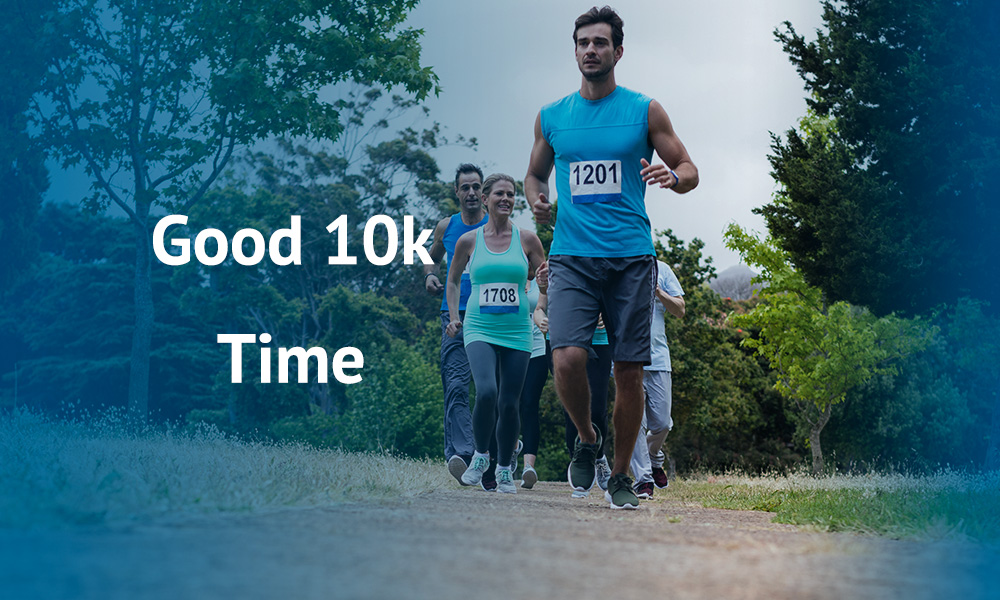The Average time for a 10k is 50 mins across all age groups and genders.
10k runs are among the most famous road races worldwide, offering novice and experienced runners a challenging yet achievable distance to conquer. Completing a 10k, equivalent to 6.2 miles, requires a blend of speed, endurance, and mental strength. But what constitutes a “good” 10k time? In this article, we’ll explore factors affecting your 10k time, provide improvement tips, and determine what a good time means for you.

Average 10k Time by Age and Gender
Males
| Age | Time (Male) |
|---|---|
| 15-19 | 45-55 minutes |
| 20-29 | 40-50 minutes |
| 30-39 | 42-52 minutes |
| 40-49 | 45-55 minutes |
| 50-59 | 50-60 minutes |
| 60-69 | 55-65 minutes |
| 70+ | 60-70 minutes |
Females
| Age | Time (Female) |
|---|---|
| 15-19 | 50-60 minutes |
| 20-29 | 45-55 minutes |
| 30-39 | 47-57 minutes |
| 40-49 | 50-60 minutes |
| 50-59 | 55-65 minutes |
| 60-69 | 60-70 minutes |
| 70+ | 65-75 minutes |
Factors That Affect Your 10k Time
When it comes to determining a good 10k time, several factors come into play:
Age and Gender
Age and gender play a significant role in running performance. On average, men tend to have faster 10k times than women, while younger runners typically outperform their older counterparts.
Experience and Training
Your running experience and the quality of your training can significantly impact your 10k time. More experienced runners with a structured training plan will likely achieve better results than those new to the sport.
Course Terrain
The difficulty of the course can affect your 10k time. A flat course will generally yield faster times compared to one with hills or uneven terrain.
Weather Conditions
Weather conditions like temperature, humidity, and wind can impact your performance. Ideal running conditions vary from person to person, but moderate temperatures and low humidity tend to be favourable for most runners.
Running Gear
The right running shoes and clothing can improve your comfort and performance during a 10k race.
Tips for Improving Your 10k Time
To achieve a good 10k time, consider the following tips:
Setting Realistic Goals
Set achievable goals based on your current fitness level and experience. Regularly reassess your goals as you progress and adjust them accordingly.
Developing a Training Plan
A structured training plan that includes a mix of long runs, interval training, and tempo runs will help you build endurance, speed, and mental toughness.
Focusing on Nutrition
Proper nutrition is essential for optimal performance. A balanced diet rich in carbohydrates, protein, and healthy fats will fuel your training and recovery.
Prioritising Rest and Recovery
Adequate rest and recovery are crucial for avoiding injury and allowing your body to adapt to the stress of training. Incorporate rest days, cross-training, and regular sleep into your schedule.
Embracing Mental Strategies
Mental strategies like visualisation, positive self-talk, and goal setting can help you stay focused and motivated throughout your 10k journey.
Understanding Your 10k Time
When evaluating a good 10k time, it’s essential to consider personal factors and context:
Age-Graded Standards
Age-graded standards take your age and gender into account, providing a percentage score that compares your time to the world record for your age group. A higher percentage indicates a better performance.
Personal Progress
A good 10k time is subjective and should be based on your progress. Celebrate personal records, improvements, and achievements, even if they may not align with others’ standards.
10k World Records
The world record for men’s 10k is held by Joshua Cheptegei in a time of 26:11.00. The women’s world record is held by Letesenbet Gidey of Ethiopia in a time 29:01.03, from 2021.
FAQ
How long does it take to train for a 10k?
Training time for a 10k can vary, but beginners typically need 8-12 weeks of consistent training. Depending on their fitness level, experienced runners may require less time to prepare.
What is the average 10k time for beginners?
The average 10k time for beginners can range from 60 to 75 minutes. However, this can vary based on age, gender, and training.
How can I increase my speed for a 10k race?
To increase your speed, incorporate interval training, tempo runs, and hill workouts into your training plan. Additionally, focus on proper running form, strength training, and flexibility exercises to improve overall performance.
What should I eat before a 10k race?
Before a 10k race, choose a meal rich in carbohydrates and moderate protein and healthy fats. Examples include oatmeal with berries and almond butter, a banana with peanut butter, or a whole-grain bagel with avocado and turkey. Be sure to allow 2-3 hours for digestion before the race.
How do I pace myself during a 10k race?
To pace yourself during a 10k, start conservatively and aim to run at an even or slightly negative split, meaning you’ll run the second half of the race faster than the first. Practice pacing during training runs, and consider using a GPS watch or running app to monitor your pace during the race.
Conclusion
A good 10k time varies greatly depending on age, gender, experience, and course conditions. You can work towards achieving your personal best by setting realistic goals, developing a comprehensive training plan, and prioritising nutrition, rest, and mental strategies. Remember, your good 10k time reflects your unique journey and progress, so celebrate your accomplishments along the way.

